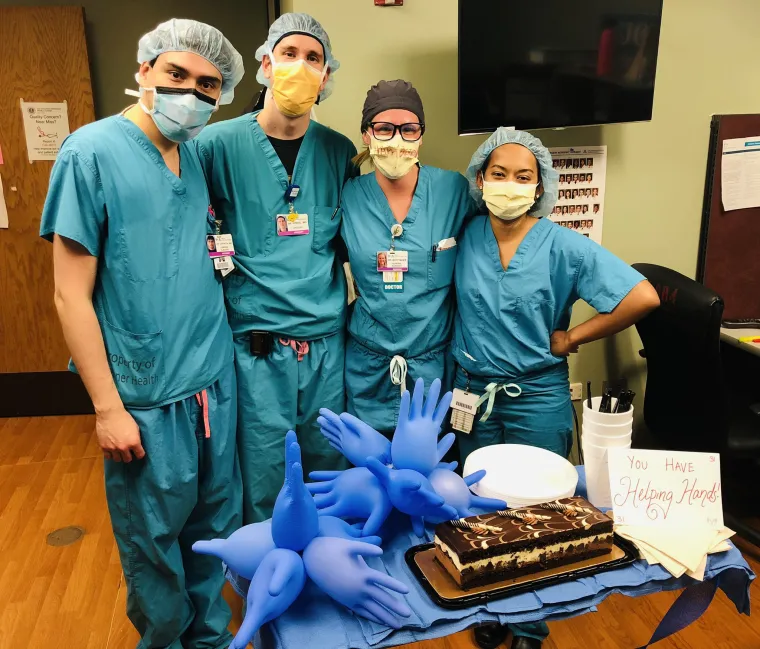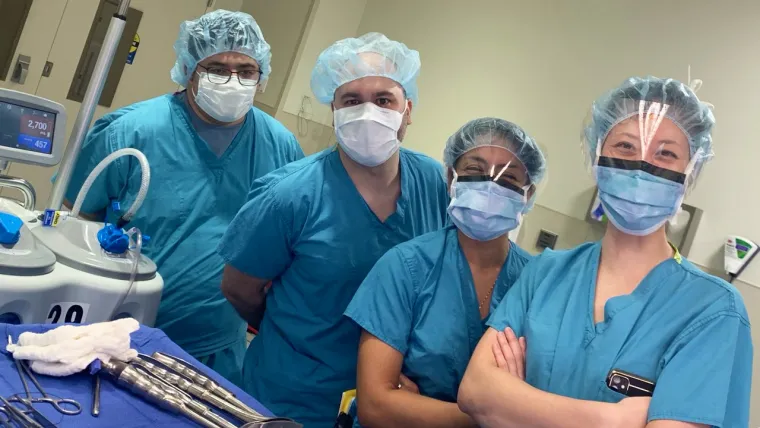Program Overview and History
The Department of Surgery at The University of Arizona has received national and international recognition in a number of fields. The Department now consists of six divisions: General Surgery; Trauma, Surgical Critical Care, Burns, and Acute Care Surgery; Cardiothoracic Surgery; Surgical Oncology; Abdominal Transplantation; and Vascular and Endovascular Surgery.
In July 1979, two established surgical residency programs (The University of Arizona General Surgery Residency Program and the Tucson Hospitals Medical Education Program, Inc.) merged to create The University of Arizona—Tucson Hospitals General Surgery Residency Program. The resulting program provides surgical residents with broad clinical experience, comprehensive education in surgical sciences, and excellent opportunities for achieving competence in basic and clinical investigation.
Three Tucson hospitals make up the foundation of the program: Banner — University Medical Center (BUMC), the Southern Arizona Veteran's Affairs Health Care System (SAVAHCS) and Tucson Medical Center (TMC). In addition, the residency program uses other community facilities to further extend the surgical experience. Consequently, the patient base of the training program far exceeds that available to many programs in the United States. We believe that only with a broad scope of clinical programs and a variety of tertiary services can the resident receive a comprehensive education in modern surgery.
The degree of clinical responsibility and of technical operative experience increases progressively with each year of training so that the residents mature not only in technical skills, but also in clinical judgment and interpersonal skills. At the same time, we believe that each resident must view his or her postgraduate education as the beginning of a lifelong inquiry into the application of scientific knowledge to the treatment of surgical disease.

Residency Training
The University of Arizona—Tucson Hospitals Surgical Residency Program provides five years of training in general surgery. Residents are selected through the National Resident Matching Program (NRMP) for categorical and preliminary positions. The program does not have a pyramidal system.
First year residents are assigned to general surgery rotations at Banner — University Medical Center, Tucson Medical Center, and the Veterans Administration Medical Center for a total of about six months. The remainder of the year is devoted to month-long rotations in vascular surgery, anesthesiology, trauma surgery, and pediatric surgery.
During the second year of training, the resident is exposed to additional surgical specialty experience, including cardiothoracic surgery. The year is rounded out with additional general surgery experience, including the basics of trauma management and a rural rotation. Rotations in the critical care unit and the endoscopy unit are also provided.
The resident's third year is largely devoted to general surgery rotations at all three training hospitals and an outside rotation in Flagstaff. On each general surgery service, the third-year resident works directly under the supervision of the Chief Resident and is therefore not only expected to assume greater responsibility in the management of the patients, but also provide for the education of junior housestaff and medical students.
The fourth-year resident, in addition to continuing his or her training in general surgery, receives training in several specialized areas of surgery, including transplantation. Further training in trauma surgery and thoracic surgery is also a part of the fourth year. Fourth year residents have an outside rotation in Flagstaff as well as an International Elective rotation.
During the final year of training, the chief resident leads general surgery services at BUMC, Tucson Medical Center, and the VA Medical Center. Chief residents are responsible for the management of their clinical service, supervision and teaching of intermediate and junior residents, and for the education experience of third- and fourth-year medical students assigned to that team. By the end of the fifth year, residents typically have performed 1,000 or more procedures, culminating an operative experience that began at the very beginning of the internship year.
Residents are encouraged to participate in research projects and, during elective periods, may work in the laboratories of surgical or other faculty members. Although a research year is not required, residents who desire additional research experience may request one or more years away from clinical training. This time is most often taken after the third year of residency. All residents are encouraged to publish interesting case reports, retrospective reviews, or the results of clinical investigations.
Housestaff from other University of Arizona residency programs, including Urology, Orthopedic Surgery, and Emergency Medicine, also participate in the various surgical teams. In-house call is typically every third to fourth night and in many specialty services (and during the fourth and fifth years) the resident may take call from home.

Goals
The goals of The University of Arizona—Tucson Hospitals General Surgery Residency Program are to:
- train clinically competent, conscientious, and empathetic general surgeons through a program of graded responsibility for pre- and postoperative patient care and operative management;
- encourage habits of self-education that will persist throughout the resident's surgical career by emphasizing participation in a variety of education processes, including attendance at conferences and scientific meetings, critical study of surgical literature, and discussion with teachers and peers, and;
- promote an interest in and foster the ability to pursue research through exposure to faculty research programs.
Residents are expected to develop the ability to analyze and evaluate scientific publications and to participate in basic and/or clinical research according to their particular interests. Extended research experience is encouraged for those considering academic careers.
Resident Education
Each Wednesday begins with a Quality Improvement & Safety Conference (M&M), followed by a Grand Rounds presentation. Residents then have up to 2 hours of dedicated didactic conference following the SCORE curriculum provided by the American College of Surgeons.
Journal Club is held six times a year at different locations in Tucson. The chief residents select the landmark articles for presentation, specifically reviewing any recent groundbreaking or practice-changing papers or research. Junior and senior residents are assigned specific articles for leading the discussion. Junior residents are asked to read and critique the article and present it to the group. Senior residents assist the junior residents and function as back-up presenters.
As a part of our continuing quality improvement on technical skills, the General Surgery Residency program conducts a monthly Cadaver Lab. The curriculum consists of two-hour blocks of time with specific procedures being performed by the residents.
Fundamentals of Laparoscopic Surgery (aka FLS) establishes a standard set of didactic information and manual skills serving as a basic curriculum to guide surgical residents in the performance of basic laparoscopic surgery. By mastering the curriculum and gathering of skills, it is expected that surgical residents and surgeons will initiate and carry out their performance of laparoscopy more effectively, with greater skill, and with lower complication rates.
Fundamentals of Endoscopic Surgery (aka FES) establishes a standard set of didactic information and manual skills designed to teach and evaluate the fundamental knowledge, clinical judgement, and technical skills required in the performance of basic endoscopic surgery.
The Arizona Stimulation Technology and Education Center (aka ASTEC) at the University of Arizona College of Medicine provides collaborative learning opportunities in a high-tech, realistically simulated environment. All PGY 1 residents in General Surgery have been included in the ASTEC training program.
General Surgery Program Manager
Jessica Taylor
Department of Surgery | The University of Arizona College of Medicine
1501 N. Campbell Avenue | PO Box 245058 | Tucson, AZ 85724-5058
Phone: (520) 626-9540 | FAX: (520) 626-2247

